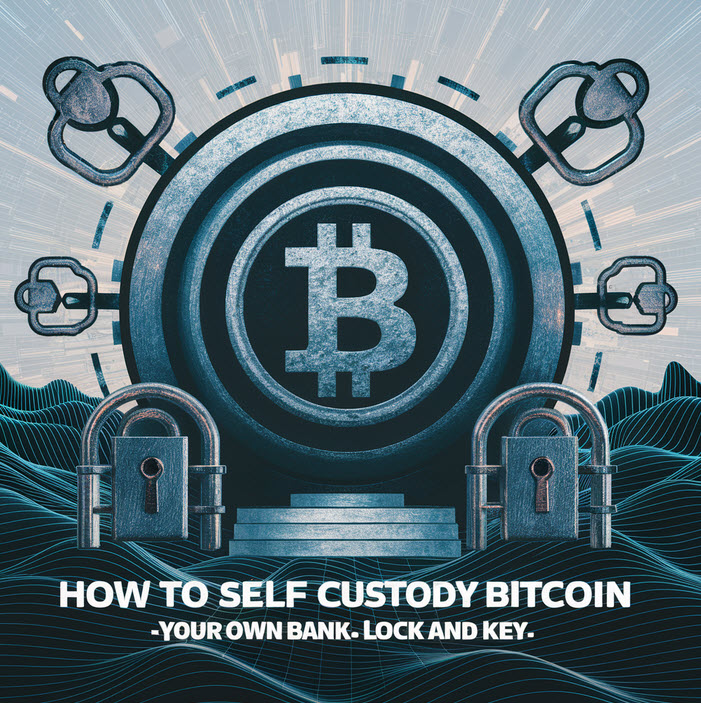How to Self Custody Cryptocurrency: Your Guide to Being Your Own Bank
Introduction to Self Custody
When you hear “self-custody,” think about hiding cash under your mattress. It’s all about taking full control of your crypto assets, without relying on a third party. In the world of cryptocurrencies like Bitcoin, self-custody means you manage your digital money yourself.
What is Self Custody?
Self-custody is when you keep control of your cryptocurrency wallet and private keys. A private key is like a super-secret password that lets you access and spend your Bitcoin. When you self-custody, you’re the only one with access to this key, just like if you hid cash in your house. The idea is simple: no bank, no third party—just you.
Why Self Custody?
Imagine you have a treasure chest full of gold. If you leave it with someone else, you have to trust them to keep it safe. The same goes for cryptocurrency. When you keep your crypto on an exchange, you trust that exchange to protect it. But what if something goes wrong? By self-custodying your crypto, you reduce the risk of losing it due to someone else’s mistake.
How to Self Custody Bitcoin
1. Get a Cryptocurrency Wallet
First, you need a cryptocurrency wallet. This is a digital tool that stores your private keys. Think of it as your personal safe. There are different types of wallets:
- Hardware Wallets: Physical devices that store your keys offline, making them very secure.
- Software Wallets: Apps on your phone or computer that store your keys. They’re convenient but can be less secure.
- Paper Wallets: Simply a printout of your keys. They’re secure from online threats but can be lost or damaged easily.
2. Set Up Your Wallet
Once you have a wallet, set it up by following the instructions. This involves creating a new wallet, writing down your private key, and securing it. Never share your private key with anyone. Recommended Wallet
3. Transfer Your Bitcoin
Move your Bitcoin from an exchange to your wallet. This is like transferring money from your bank to your personal safe. Follow the instructions on your wallet app to receive Bitcoin, then send it from your exchange account.
The Light Bulb Moment: Why Self-Custody is Crucial
Keeping your crypto on an exchange is like storing your gold in someone else’s vault. You hope it’s safe, but you don’t have control. Self-custody means you’re the only one in charge of your Bitcoin. If you lose your private key, your Bitcoin is gone forever. But on the bright side, no one else can access your funds without your permission.
The Risks of Not Self Custodying
If your Bitcoin is on an exchange and that exchange gets hacked or goes bankrupt, you might lose your funds. We’ve seen this happen with big names like FTX. By self-custodying, you avoid these risks. You don’t have to worry about someone else’s mistakes or dishonest behavior.
Making Self Custody Easier
Over the years, self-custody has become easier. Wallets are now more user-friendly, and there are more resources to help you. Companies like Casa are working to make self-custody even more secure than traditional banking.
Final Thoughts
Self-custody is about being your own bank. It requires responsibility and care, but it gives you control and peace of mind. Remember, the person you should trust most with your crypto is yourself.
FAQ: How to Self Custody Bitcoin
What is Self Custody?
Self custody means taking full control of your Bitcoin and other cryptocurrencies by managing your private keys yourself. This way, you are responsible for securing your digital assets, rather than relying on a third-party service like an exchange. It’s like storing your cash at home instead of in a bank—you are the only one with access to your money.
What is a Cryptocurrency Wallet?
A cryptocurrency wallet is a digital tool that allows you to store, receive, and send Bitcoin and other cryptocurrencies. There are different types of wallets, each offering various levels of security and convenience:
- Hardware Wallets: These are physical devices that store your private keys offline. They are very secure and protect your keys from online threats.
- Software Wallets: These are apps that you can install on your computer or smartphone. They are convenient and easy to use but can be vulnerable to online attacks if not properly secured.
- Paper Wallets: These are simply printouts of your private keys and public addresses. They are secure from online threats but can be easily lost or damaged if not stored carefully.
- Recommended Wallet: Meet your new digital fortress: This isn’t just a wallet; it’s a battle-tested (For 10 years) stronghold for your coins. Order now
By understanding and implementing self-custody, you protect your assets in the best way possible. Just like hiding cash under your mattress, self-custody is a new paradigm for managing your digital wealth.
Move faster on the path of less resistance..
Related Posts
